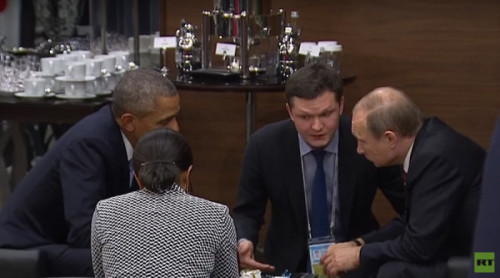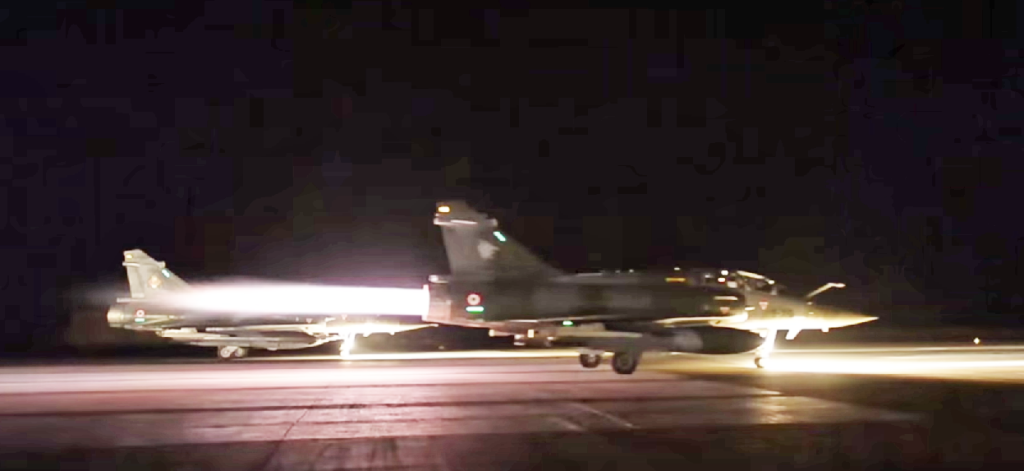PHOTO: US President Barack Obama and Russian counterpart Vladimir Putin on the sidelines of the G20 summit in Turkey on Sunday
Published in partnership with The Conversation:
Even as Parisians were trying to assess the scale of the Islamic State’s attacks which killed 129 people last Friday night, politicians were promising a firm and effective response.
French President Francois Hollande assured, “We will be merciless toward the barbarians of Islamic State group. Faced with war, the country must take appropriate action.”
British Prime Minister David Cameron responded, “Your values are our values, your pain is our pain, your fight is our fight and together we will defeat these terrorists.”
US President Barack Obama — who had said on Thursday that “we have contained” ISIS in Iraq and Syria — assessed, “Those who think that they can terrorise the people of France or the values that they stand for are wrong.”
So how are those promises being fulfilled? The results so far have been decidedly mixed — not only following Paris but also after IS’s recent deadly double suicide bombing in Beirut, and the October 31 bombing of a Russian aircraft with 224 passengers and crew over Egypt’s Sinai Peninsula.
See Syria & Iraq Audio Analysis: The Islamic State, Security, and Intelligence
Syria & Iraq Audio Analysis: How Do You Fight the Islamic State?
Governments are scrambling to boost security at home and while the French have carried out retaliatory airstrikes inside Syria, but there is little sign of anyone grasping the nettle: unless and until the local causes giving rise to the Islamic State are addressed, the threat is unlikely to be contained, let alone removed.
Security at Home
Addressing the French Parliament on Monday, President Hollande promised measures to “destroy the Islamic State”. Following up Hollande’s declaration of an “act of war”, Interior Minister Interior Minister Bernard Cazeneuve spoke of raids that detained 21 people and put another 104 under house arrest: “Let this be clear to everyone, this is just the beginning, these actions are going to continue.”
British Prime Minister Cameron was even quicker in his emphasis on homeland security. The Government, which had already tabled a bill for monitoring of Internet use before the Paris attacks, promised a 15% increase in budget and staffing for the intelligence and security services. Cameron reassured that seven recent plots within the United Kingdom had been foiled and pledged even more vigilance: “This extremism and perversion of Islam — this is a challenge we have to face with everything we have got.”
Obama said the US would give full support to European allies: “[We will] allow our personnel to pass threat information, including on ISIL [Islamic State], even more quickly and more often.”
The Military Response
France sent another message on Sunday night with at least 12 sorties dropping more than 20 bombs on Raqqa, the Islamic State’s central position in northern Syria. The French Defense Ministry said a command post, recruitment centre, arms and munitions depot, and training camp were targeted. Local activists said a stadium, museum, clinics, a hospital, a chicken farm, and a local governmental building were hit.
French warplanes take for airstrikes on Raqqa in northern Syria on Sunday night
The Ministry also said the aircraft carrier Charles de Gaulle, with 18 Rafale and 8 to 9 Super Etendard strike fighters aboard, would leave the port of Toulon by Wednesday.
The more significant developments have been on the ground, however. In northeast Syria, the “Syrian Democratic Forces”, Kurdish-led and including Arab and Armenian Christian units, claimed that they had taken almost 1,400 sq km (about 850 sq miles) of territory and killed almost 500 Islamic State fighters between October 30 and November 13.
On the day of the Paris attacks, Kurdish militia also claimed a notable victory in northwest Iraq. Supported by US airstrikes, the peshmerga led an offensive recapturing the town of Sinjar, which had been occupied by the Islamic State in August 2014.
The advance threatened to cut an ISIS supply route between northern Iraq and northern Syria. It was also a powerful symbol: the loss of Sinjar had led to the flight of thousands of members of the Yezidi religious sect, with many killed or captured by the Islamic State and others facing death by starvation, thirst, or lack of medical care as they were stranded on a nearby mountain. Their plight was the basis for a US airlift, followed by the first American airstrikes on ISIS.
The Political Evasions
However, neither the talk about security at home nor the military success offered any address of the core issues behind the Islamic State’s rise in Iraq and Syria.
On Saturday, 17 countries, the European Union, the Arab League, and the UN gathered in Vienna for the second set of talks about the 56-month Syrian conflict. The meeting proposed a new constitution and elections by spring 2017, but avoided any reference to the future of President Assad. US Secretary of State John Kerry said, “We still differ on what happens,” but offered no indication of a resolution.
Instead, Russia used the conference to put its agenda of labeling many of Assad’s opponents — not just the Islamic State — as “terrorists”. While the meeting balked at labeling groups apart from ISIS and the Al Qa’eda-linked Jabhat al-Nusra, Moscow was able to shift the focus away from the Syrian President.
In that diplomatic arena, the Islamic State is a convenient sideshow. The Russians can point to it as part of the terrorist menace, while the US and European countries can feature it to avoid the difficult questions about the battle between Assad — who, rather than ISIS, is responsible for the vast majority of the more than 300,000 deaths and 11 million refugees and displaced Syrians — and his opponents.
The Islamic State is weaker inside Syria than a year ago. It has lost territory in the north and northeast to Kurdish-led forces and it has been checked on other fronts by the rebels whom it has been battling since January 2014. However, it continues to feed off the instability and destruction in Syria since 2011, and there is little prospect that Vienna’s statements will assuage this.
In Iraq, the Kurdish-led victory at Sinjar has dented not only the Islamic State’s hold on territory but its image of strength. However, it soon offered a sign of the challenges beyond a military victory: reports circulated of Kurdish clashes with Turkmen Shia militia, reportedly fed by Kurdish damage and burning of Turkmen property.
Any effective response to ISIS will have to offer the alternative of a legitimate authority, whether on a local or national level, which can move beyond the religious, ethnic, and social conflict that fractured Iraq and thus offered the space for the Islamic State to expand. So far, that sign has not come from Baghdad or from recently-liberated territory.
For now, politicians will probably focus on “security at home” and authoritative rhetoric, rather than on proving their actions are effective. But if they want to be taken seriously, they will need to provide evidence of serious damage to the Islamic State — and dealing with the causes behind the rise of the militants — as soon as possible.
![]()


